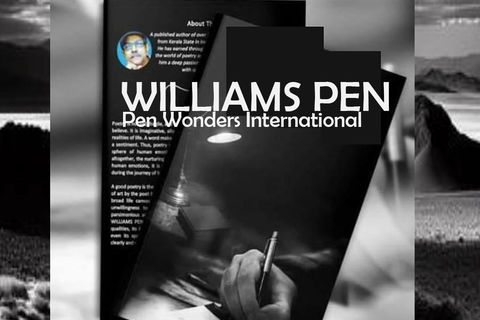POETIC VIEWS BY WILLIAMSJI MAVELI

POETIC VIEWS BY
Williamsji Maveli
POET:
Annalyn G. Mercado
POEM:
THE ORPHANS
“They are orphans
His father was a rebel
Lived in the dense forests
Fighting for their land rights
Against the tyranny of Hacienderos
Landlords who took the lands of farmers
They used their bolo and knives
Hoping that their voice will be heard
Their muffled cries were drowned by bullets
Rifles that targeted their bodies and heads.
Bodies were displayed in the plaza
Branding them as the enemy of the nation!
Each family suffered from humiliation.
Fled to the mountains to avoid execution
Young children sacrificed without education
Out of danger when there were commotion
A new life, forgetting the past.
Their mother worked, night and day.
Her children need to be fed.
Sell goods in the market.
A place where no one knew her identity
Or else, she will end up in prison.
As years went by, she became sick.
Her frail body soon weakened.
Her children are crying in starvation
At the young age of seven and nine.
In their bare hands, they covered
their mother's remains with wildflowers.
They soon matured in a couple of years
Learn to hunt and plant sugarcanes
In their small nipa hut, they still craved
Their mother's passionate love and care
Soon, they will witness the oppression
His father's voice will echo from his grave
The past and the present are intertwined
The battle will continue to stop aggression”
©® All rights reserved.
Annalyn G. Mercado
Philippines
POETIC VIEWS:
The poem delves into the enduring legacy of oppression and the cyclical nature of violence. It highlights the struggles of families affected by land disputes and political turmoil, particularly focusing on the plight of orphaned children.
The structure of the poem is divided into stanzas, each exploring a specific phase of the orphan’s lives. This structure allows for a chronological progression of the narrative, from the tragic loss of their parents to their subsequent struggles and resilience.
The poem employs vivid imagery to paint a picture of hardship and suffering. The description of the father's rebellion, the mother's tireless work, and the children's poverty-stricken existence creates a strong visual and emotional impact.
The "bolo" and "knives" symbolize the desperate resistance of the oppressed, while the "wildflowers" represent a fragile hope amidst adversity.
The repetition of consonant sounds, such as "f" in "fought for their land rights," adds a rhythmic quality to the poem.
The tone is somber and melancholic, reflecting the tragic circumstances of the orphans. The mood shifts between despair and defiance, as the characters endure hardship but also exhibit resilience and a determination to fight for justice.
The poem is narrated from an omniscient perspective, allowing the poet to delve into the thoughts and feelings of the characters. This broad perspective enables the poet to explore the collective experience of the oppressed.
The poem's vivid imagery, strong emotional resonance, and cyclical narrative structure make it a compelling exploration of the human cost of conflict and the enduring spirit of resistance.-AUTHOR WILLIAMSJI MAVELI
Like 0 Pin it 0


